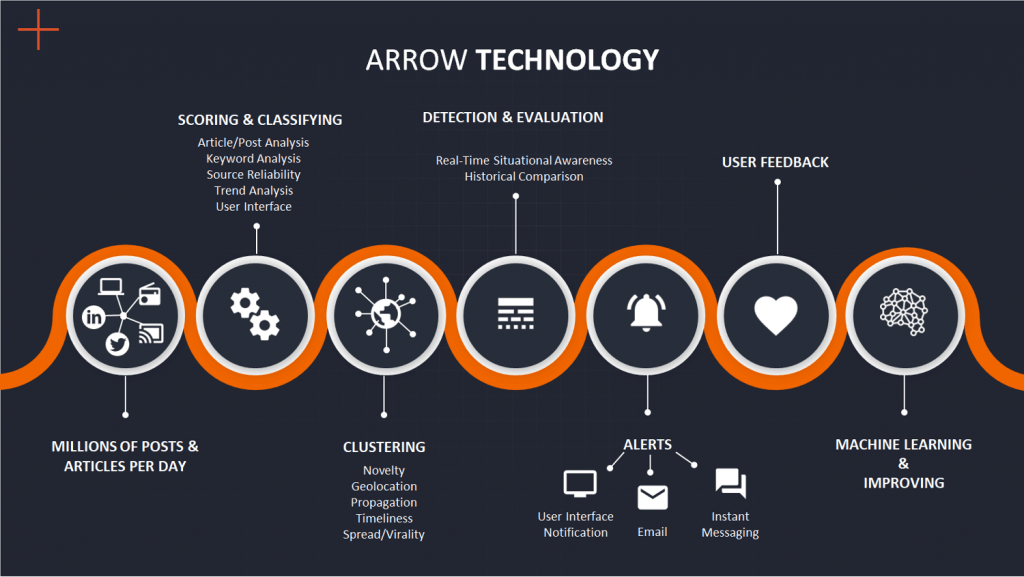South African startup VoxCroft is building state-of-the-art intelligence and risk analytics solutions for government and private customers, helping decision-makers by providing them with accurate, timely, and relevant information.
Founded in 2018, VoxCroft specialises in open-source intelligence (OSINT), an oft-neglected source of insight differentiated from the other forms of intelligence such as human intelligence (HUMINT) or signals intelligence (SIGINT) in that it relies on open-source data.
“Open-source data broadly speaking is any data that’s publically available – think social media posts, news articles, blogs, and even print and broadcast media. The key is that there are oceans of information available and our expertise lies in extracting the most valuable insights with our unique machine augmented approach,” Barend Lutz, co-founder and chief executive officer (CEO) of VoxCroft, told Disrupt Africa.
The startup has just launched Project Arrow, a new automated intelligence platform to help organisations manage risk. Project Arrow uses machine learning to collect and sort open-source media, including tweets, media articles, newspaper articles and even radio broadcasts, delivering real-time situational awareness and data-driven analytics to a decision-makers’ desktop or smartphone.
Highly-trained human intelligence analysts work with customers to understand their analytics needs, train the AI, and make judgements about the quality of content and sources. Customers can track trends on ongoing events such as terrorism, natural disasters, crime trends and protests.
“The combination of machine and human minds means that the highest quality intelligence reporting is now within reach,” said Lutz.
How does it work in practice? A customer will approach VoxCroft with topics in a specified region that interest them, or a risk that they fear, such as terrorist incidents or protests that might threaten their operations.
“Our expert analysts work closely with the client to then determine sources and ancillary topics that might be pertinent. Next, the Project Arrow platform collects, tags, and even translates relevant information. Analysts work in conjunction with machine learning algorithms to make judgements on what information would be the most relevant to the customer, and any critical information is sent as alerts to the customer,” Lutz said.
“This is an iterative process where feedback from the client and the analyst team is fed into the machine learning algorithm and teaches the machine to become smarter to cater to exact client needs.”
To give a concrete example, one customer wanted to protect their mobile staff such as delivery drivers and sales people in South Africa. They worked with the VoxCroft team to identify topics such as protest actions, crime waves, and natural disasters that could pose a threat to the employees.
“If a protest sparks near one of the routes of a delivery driver, the logistics manager and driver receive real-time alerts via SMS so they can avoid it,” said Lutz.
All very impactful, and extremely cutting edge. Yet the tech needs honing with human influence, something Lutz believes VoxCroft does well.
“Open-source data has exploded over the last decade, overwhelming human analysts. Solutions tried to replace expert human analysts who had years of experience with largely untrained machine learning models with disappointing results,” he said.
“We realised that to get the exacting level of accuracy, timeliness, and relevance of intelligence required by our customers we needed the speed and breadth of machine learning algorithms, but the judgment and contextual understanding that you only get through the tradecraft of trained analysts. The solution is what we call Distributed Intelligence Augmentation, where a distributed network of analysts, data scientists, language and area experts, and machine learning algorithms are integrated through proprietary workflows to find, assess, and analyse global developments.”
Other than enhanced timeliness, accuracy, and relevance of intelligence, Lutz says the setup also results in highly customisable coverage for customers.
“You can focus on niche or specialised topics, or very specific geographical coverage which can be as limited as a building and public transport routes leading to the building,” he said.
VoxCroft has bootstrapped from day one with large contracts with US companies, and has seen “overwhelming” uptake of its solutions.
“As you might imagine, the applications for high quality intelligence and risk analytics is incredibly wide. We have interest from customers as diverse as global humanitarian organisations, government agencies, sporting bodies, and financial institutions. All leaders require enhanced intelligence to make sense of an increasingly unstable and complex world to be able to make the best possible decisions,” said Lutz.
“Our largest customers are in the public sector in the US, and we have private customers in the US and South Africa. While the core development team will remain in South Africa, we are currently in a funding round to expand our presence in the US to address the demand there.”


